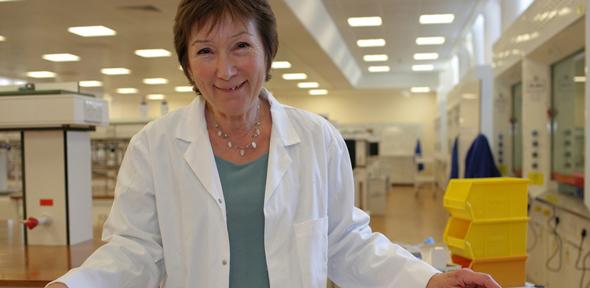
Athena SWAN awards recognise good employment practice for women working in STEMM subjects. They also play a role in recruiting the best academics and maximising the competitiveness of departments at Cambridge.
Chief Medical Officer Sally Davies has made it clear that the National Institute for Health Research would only expect to shortlist medical schools for biomedical research centre and unit funding if the school held a silver Athena SWAN award.
So what are Athena SWAN awards?
The awards are part of the Athena SWAN Charter for women in science, which recognises commitment to advancing women’s careers in STEMM academia (science, technology, engineering, mathematics and medicine). More than half of all higher education institutions that are active in STEMM subjects are members, including 23 of the 24 Russell Group universities. Athena SWAN awards are available in bronze, silver and gold at both University and departmental level. The University of Cambridge has just had its bronze award renewed. No university has been recognised at gold level, and only three of the 51 University awards are at silver level: Queen’s University Belfast; the University of Nottingham; and Imperial College London.
How many departments at Cambridge have awards?
At the time of writing, the Department of Chemistry and the Department of Materials Science and Metallurgy have just received bronze awards; the Cavendish Laboratory has held a silver award since 2010, although it is waiting to hear if it has been successful in applying for gold. The following institutions are also awaiting news of an award application: the School of Clinical Medicine; the Department of Engineering; and the Department of Veterinary Medicine. All of the remaining STEMM departments and institutions are preparing Athena SWAN applications for submission in either 2013 or 2014.
Why are Athena SWAN awards important to the University?
STEMM subjects have traditionally suffered from an under-representation of women, and science cannot reach its full potential until it benefits from the talents of the whole population. Athena SWAN awards, and the application process involved, help departments improve the recruitment, retention and promotion of female academics. The awards therefore play a significant role in helping departments carry out research at the highest standards of international excellence and maintain a competitive advantage. The process of reviewing and establishing good working practices around induction, staff development, training and flexible working as part of an Athena SWAN submission benefits the whole workforce.
How do you apply for an award? What is involved?
That depends on the department and the award being applied for. For a first-time bronze application, the department will need to make a thorough assessment of how well it promotes equality of opportunity, and to identify areas for improvement. The first step is to collate and scrutinise (and ultimately submit as part of an application) a range of quantitative data that capture key gender trends. A detailed action plan will need to be drawn up to address gender imbalances. The department will also need to explain in its application how it will promote a culture of inclusivity and assist women at key career points. Department heads will be asked to write a statement of support. Awards last for three years. For a silver award, departments must be able to show a significant record of activities to support gender equality and demonstrate the impact of good practices.
When should applications be made?
There are two submission rounds each year. Deadlines are the last working days in April and November.
What support is available from the University?
Bronze applications tend to take departments between six and nine months to complete. Departments will need to set up an Athena SWAN self-assessment panel, comprising an academic lead, key administrative staff and student representatives. Each department will also get an assigned contact from the E&D team who can provide expertise, advice and guidance from the start of the process all the way through to submission. It is advised that the assigned contact is included as a member of the department’s self-assessment panel so that they can provide the best support throughout. In addition, the University provides the following central support to departments: provision of data required for submission; regular workshops on data, presentation and good practice; web-based ‘how to’ information; and a practical toolkit to guide the process and share knowledge and good practice.
Is there anything else I should know?
In some research areas, future funding is likely to be tied to an institution’s commitment to Athena SWAN. In 2011, Chief Medical Officer Sally Davies made it clear that the National Institute for Health Research would only expect to shortlist medical schools for biomedical research centre and unit funding if the school held a silver Athena SWAN award. She suggested that this would come into effect at the start of the next funding period in 2016. Meanwhile, the Research Councils UK expect those in receipt of RCUK funding to provide evidence of commitment to equality and diversity, and participation in Athena SWAN is mentioned as one piece of such evidence.
Who do I contact for more information?
Call WiSETI Project Officer Vivien Hodges on 60424 or email her on vivien.hodges@admin.cam.ac.uk.
